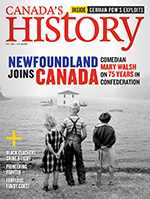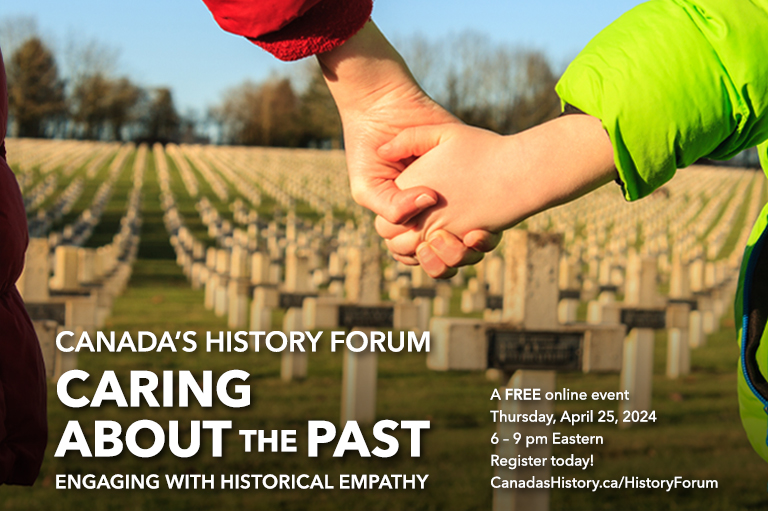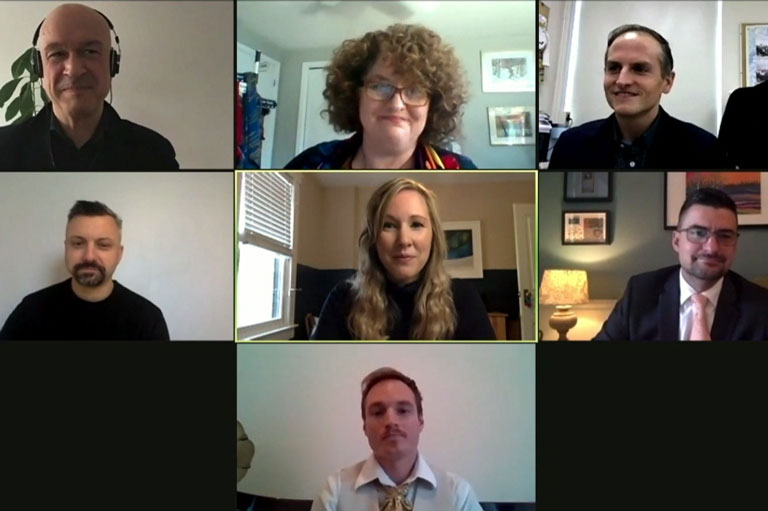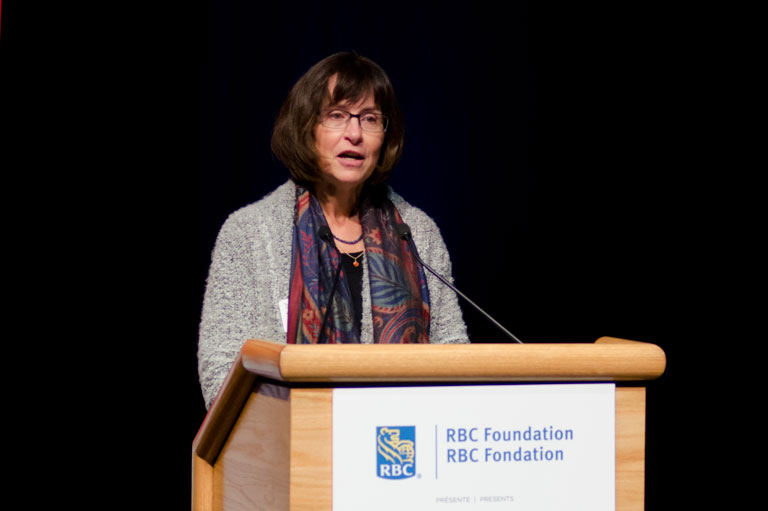Discover a wealth of interesting, entertaining and informative stories in each issue, delivered to you six times per year.
History and Collective Memory
This presentation was given at the first Canada’s History Forum held on November 2, 2007 at Carleton University. The forum was held in conjunction with the 2007 Governor General’s Awards for Excellence in Teaching Canadian History.
It is said of young people that they know little about their past. This is true. However, this does not mean that they know nothing about it or that they have no sense of the history of the country as a whole that they inhabit. In this regard, the numerous surveys that point to an apparent deficit of historical knowledge among young people may in fact hide more than they reveal.
For about ten years now, I have been conducting research on how much young Québécois (those in their 4th and 5th years of secondary school, in CEGEPs and at university,) remember of the historical Québec experience. Instead of asking them about particular aspects of history, events and personages, I ask them simply to recount the history of Québec as they know it, from its beginnings. Of course, I take great care to not give my respondents any particular indication about when Québec history starts, nor any specification regarding central events, important figures or the evolution of such history as a whole. In fact, the young people are free to recount to me any aspect of history that they want regarding the Québécois adventure through time. I ask them simply to answer the question seriously – and the vast majority of them, almost 99%, obey my prescription. In 45 minutes, they share with me their history of Québec. Some of them deal with the question in two paragraphs, others, more verbose, extend their statement to three pages.
Over the years, I have thus amassed more than 3 000 short accounts of the history of Québec by young Québécois from different languages and cultures. I fully admit that these accounts are rather rudimentary, indeed banal, especially those written by students in the 4th year of secondary school. It is easy to imagine: at fifteen or sixteen, without exception, one knows little about society’s past, and what one does know is rather shapeless or general. This said, contrary to what we often hear, young Québécois – this is less true in the 4th year of secondary school, but nevertheless -- are not without what one might call a « general view of Québec history. Among French-speakers, this view of history is presented as follows: because of the “Other”, with a capital “O,” our destiny was diverted and our search for self hood took the form of a struggle for survival. This view is decidedly simple, if not to say simplistic, but it is nevertheless present, and forceful in its simplicity. Moreover, it asserts itself as the young person matures and as he passes through the stages of his school career. In 5th year the view proposed by young Québécois of the history of their society is already becoming more detailed than it was a year ago. The progression follows its course through CEGEP and into university. But there is no fundamental break in the shape of the account. With the years, the original view is consolidated, the account becomes denser, and ends up being self-generating, the facts of the past orbit around the narrative, and the shape of the account dominate the satellite elements. It is as if history, supported by the past, ends up existing in spite of it – sometimes with it, to be sure, but sometimes also counters it.
I have long pondered this paradox, which requires that young Québécois, without knowing their society’s history well, nevertheless have a strong sense of their history. To what can we attribute this fact – since this surely isn’t specific to this particular group of young people, what should we learn from them?
The first hypothesis that comes to mind is to suggest that the Québec national history course, compulsory in 4th year, is – or rather was, as it has just been replaced by a course in citizenship history and education – a veritable telescope of historical awareness. Stated another way, it is because they take this course in national history that young Québécois adhere to the particular view of Québec history that shows up in their personal accounts. There is something to be said for this hypothesis. It is clear that after having taken the national history course, young Québécois – and I am speaking here of Francophones – have a more extended and firmer view, more politicized also, of that which was the historical experience of their society.
Is it the history program which, presenting the Québécois’s past during the period of a nation in search of selfhood, but thwarted in reaching its destiny, has oriented groups of young people towards a particular presentation, understanding and interpretation of what Québec’s adventure through history was? Is it the teachers who put forth in the classroom a tainted collection of views of what Québec’s past was, views that gave students the interpretation that they have rather than some other interpretation? I cannot respond to these two questions in the negative. But I am ignorant of up to what point one must consider the history program and the work of teachers as being at the source of the paradox that young Québécois have a strong sense of the history of their society without having mastered the past well.
Let us first turn to the case of Quebec’s “national” history curriculum. I do not think that this curriculum, in its former version, and even less in its recent version, can be qualified as ‘nationalist.’ If it is, it is certainly no more so than elsewhere. History programs that do not aim to inculcate a certain identity-informing sediment while transmitting knowledge of the past to young people are rare. However, the history program in Québec, in itself, has never aimed to construct a history of “Us”, with a capital “U,” as Quebecois, founded on some stigmatization of the “Other,” with a capital “O,” as the obstacle to destiny. In fact, it is just the opposite. Without minimizing the role of the “Other” in the Québec equation, the narrative shape of the program, not necessarily overt in any event, has always put the accent on the grey zones within which the Québécois collective has grown up. A collective reworked over a long period by national ambition but in ambiguous rather than unequivocal manner.
If it is not in fact the “National History Program,” or at least this alone, that explains students’ views, then we must turn to the teachers. They’re the ones who are responsible! Here too, we need to show caution. First, all teachers do not come from the same mould and do not have the same view of Québec’s adventures through history. Moreover, we are speaking here of professionals who, in the great majority, acquit themselves of their role honestly and appropriately – I have no interest in contradicting this fact this afternoon!
Their goal is not to make themselves ideologists in the classroom, but to allow young people to assimilate knowledge and familiarize themselves with the historical method. I do not doubt that there are teachers who, relatively often, step over the thin line, not always guarded, that separates science and politics. But young people are not imbeciles who can be made to swallow any old thing. Without being able to react in a critical manner whenever something is given as information and interpretation, they demonstrate a healthy scepticism towards Manichean or unilateral points of view. Certainly, they exhibit trust in their teacher or professor, but these teachers must also prove their competence to them in many ways. However, this proof of competence often is communicated via the transmission of a nuanced knowledge that respects the intelligence of the listeners, in this case students.
Although we can’t dismiss outright the possibility that the history program and teachers may have something to do with the assimilation of a particular view of the history of Québec by young people, we should probably look elsewhere for the root cause as to why this generation largely adheres to the thesis that, because of the “Other,” with a capital “O,” Québec destiny was diverted from its course to the point that the collective quest of the Québécois has taken, right up to the present, the form of struggle for survival.
This other root cause, I suggest, is found in what one calls “collective memory,” a kind of view of oneself that, transmitted from generation to generation, impregnates Québec society in all representations that it produces about itself.
It is not easy to identify the fuels of production and diffusion of this collective memory. They are surely innumerable. The family is one, as much as film-makers and the cinema, newspapers and journalists, the political circuit and politicians, stories and story-tellers, songs and singers, literature and the literati. In fact, all those who create narrative forms, a heritage of stories, the declarative system by which Québec society recounts itself to itself, puts itself on stage in the world theatre and reveals itself to Others, are appointed, or appoint themselves, as producers and diffusers of collective memory.
So, from the youngest of ages, young people are subject, directly or indirectly, to this self-stating system into which they are socialized as participants of a community of communication, which is also a community of memory and of history. Once again, this socialization, through and within a memory and a history, is by no means unique to Québécois young people. The phenomenon is cultural, which means that it is universal. I will not go into detail regarding the process by which this socialization takes place. I will satisfy myself in drawing out its implications for my own purposes today.
Socialized in a culture, thus initiated into a memorial and historical heritage which is offered and transmitted to them, young people arrive at school carrying a store of references that permit them not only to give meaning to the world around them, but also to localize it and mark it out. In this world that surrounds them, they are situated both as singular individuals and as members of a group. Their personal experience often has little in common with the general references cited by their group who, moreover, is always envisage these references in their generic and « ideal-typical » characteristics rather than through concrete figures of real personalities. It is this that allows for the possibility for a contradiction between the situation or the individual orientation of a person and that of a collectivity, without this contradiction being lived by the individual as a type of aporia.
In any event, young people do not come to school as a tabula rasa – and especially do not when they are adolescents. (It is to be understood that I am limiting myself to the domain of my own competence, that of the blankness of the historical memory of the parties concerned). Contrary to how they are sometimes perceived, young people are anything but empty vessels waiting for someone to pour knowledge into their vacant and waiting skulls. Before reaching college, young people already have views, interpretations, and also expectations, and it is as active listeners, even if they are unaware of being such, that they participate in their history courses. In fact, young people are as receptive as they are resistant when they take their first history course in 4th year of secondary school. They are bearers of a collection of narratives, clichés, stereotypes, and historical myths, more or less anchored in their imagination, which predispose them to assimilate or reject information or interpretations that are transmitted to them. This is the teacher’s challenge, that of opening up and making more complex this imagination, or of battling the closed-mindedness, the firmness, the palisades already erected or present in the minds of young people.
What I just said summarizes an important point: we are, Franco-Québécois, Anglo- Quebeckers, Canadians or otherwise, caught within our respective “myth-histories.” We cannot easily turn away from or deconstruct these mythic histories. They are often at the base of our understanding of the world, which is not reasoned out or reasonable, but largely enchanted and metaphorical. Thus, for French Québécois, « les Anglais » remain those who prevented a nation from blossoming to the fullest of its possibilities and who still stand in its path. For English Canadians, the Québécois – by which I mean of course French-speaking Quebeckers – appear to be a rabble of complainers who can never get enough and who ought to accept the fact that they lost the Battle of the Plains of Abraham in 1759. What do these views of history have to do with the past? I would be the last to say that they have nothing to do with it. We cannot deny the Battle of the Plains; nor the colonial system put in place by the British; nor the struggle of Canadians, by which I mean historical Canadians, to have their collective rights recognized, etc. This said, the historical Canadian experience, within which has run up to now the historical Québec experience, includes many grey zones which a history made up of ‘good guys’ and ‘bad,’ of ‘reasonable’ and ‘emotional’, of “complainers” and “nice guys, ” is described poorly.
How do we induce people, and young people in particular, to assimilate the more complex history of a country which has always been dissonant and the relative strength of which resides perhaps in the political recognition of this dissonance rather than in its negation? One thing is sure: the enterprise is a formidable one. It is not easy to deconstruct the historical myths out of which arise not only a view of the past but also a view of oneself, because mythical history has a function in building identity. To deconstruct a narrative of history is in fact to unravel, or at least to destabilize, a collective identity. The furore that, in the spring of 2006, marked the implementation of the new history curriculum in Québec is a case in point. It was not so much the constructivist perspective inherent in the program that concerned the detractors of the government initiative as it was the idea of recounting to young people a history of Québec that departs from the regular canon. To depart from a historical canon, the links with collective memory of which are intimate and tenacious, is in fact to detach oneself from a view of “Us” with a capital “U,” and to replace it with a different view of Us. Yet, it is always a concern for those who want to impose their hegemony of meaning onto the process of the production of society, to reconstruct otherwise an Us that often coincides with their Us.
Such history wars do not only exist in Québec. A number of years ago, Jack Granatstein departed on a crusade against those who were denationalizing Canadian history. Contested in the university world, the historian was a big hit with public opinion. Granatstein’s position is today supported, I do not doubt, by many lobbies who would like history to succeed in provoking that which politics, apparently, is not managing to produce, that is, a unified country around one convergent and consonant view of itself. It is not just in Québec that history is under scrutiny…
What place is there for teaching and for teachers in a context where the pregnancy of collective memories, mythical history and discourse about history is so powerful in constructing the representations through which people, including young people, give meaning to their individual and collective lives?
I may possibly disappoint you by delivering to you a little more traditional of a response. There is no other horizon for teaching and for teachers than that of rigour and complexity.
By rigour, I mean here the concern for facts, respect of that which is uncovered, the duty to reveal the ambiguity of situations. There are limits, come up against quickly, to making of the story of the past an account of identity for the nation or for the groups constituting it. History does not have to be put into the service of causes. The nobility of teaching is to lead young people into seeing the world as it was at other times, in introducing them to perspectives which arise from common sense, in confronting their acquired ideas, in leading them into other declarative or interpretative places that they did not suspect might exist, all the time avoiding abandoning them to their lot. This approach, of course, does not always work, and does not work for everybody. This is no reason to stop. A teacher is a base like a parent: they have as their mission spreading hope to all around them by never ceasing to believe that they can help others, as best they can and despite difficulties, to reach the end of the path.
I said that complexity should be one of the horizons of teaching and teachers. By complexity, I mean the concern to stimulate among young people, the often composite, confused, embroiled, ambiguous, evasive, equivocal, paradoxical and fuzzy character of what has been. This is not to say that one cannot propose an interpretation that suggests a general understanding of the past. But this interpretation cannot rest on a trenchant view of things where everything appears logical, determinate, deliberate and organized; where there is one side of winners and another of losers; where history seems to have played out before even the event ever took place. This insistence on the complexity of things, which has as a consequence the adding, in rough fashion, of variables into the equation of a historical situation, is in a sense a liberator. In the mind of the young person, it inoculates against the idea that there is an architectonic script or teleology of the past; also suggesting the idea that it is men, in the maelstrom of their actions, borne along by their ideas and constrained by the contingencies of the moment, who produced history; the idea, in the end, that there is always the possibility of doing, in the future, something other than what has made us in the present. An account of history founded on the complexity of things is, all at once, demanding and liberating in that it asks, to those who offer as well as those who receive it, that they criticize that which seems established and dialogue so as to understand, including understanding themselves.
Nothing is either simple or easy in our world. To change history, indeed even if only to defy mainstream narratives, is something of an arduous and delicate nature. It is however the responsibility incumbent upon us as intellectuals, historians and teachers to do so. Just as memory must be recognition and distance of contemporaries in relation to those of the past, history must be a tireless interrogation of man as he places a foothold in his present so as to give himself the means to confront the future.





